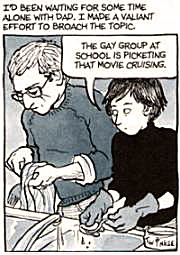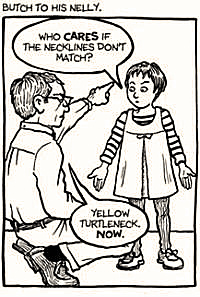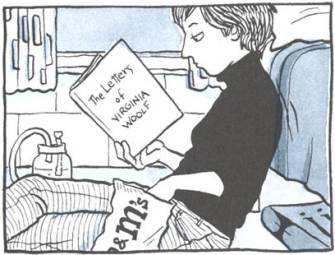 Home > CR Interviews
Home > CR Interviews CR Holiday Interview #19—Johanna Draper Carlson On Fun Home
posted June 19, 2010
CR Holiday Interview #19—Johanna Draper Carlson On Fun Home
posted June 19, 2010

 Johanna Draper Carlson
Johanna Draper Carlson has been reviewing comics on-line
through a devoted web site (and a billion other places) for a little more than ten years now, and was on Usenet reviewing comics for seven years before that. If 80 percent of any life's endeavor is showing up, Johanna was pulling high marks in comics reviewing long before anyone else in this series, myself included, thought about joining class. One thing I find fascinating about Johanna's outlook on comics is she maintains a strong sense of comics as objects of consumption. After she's rapped some company in the nose with a rolled-up product representing a less than stellar effort, it's hard not to refer to her as the North American comic book industry's leading consumer's advocate as well as one of its more popular reviewers. One book on her list was Alison Bechdel's
Fun Home. -- Tom Spurgeon
*****
TOM SPURGEON: Johanna, you and I were recently cited in someone's web post as examples of reviewers who have been around for years and years. I think it was meant in complimentary fashion. Do you feel like you've become a better writer over the last 10 years; do you feel your perspective is an advantage?
JOHANNA DRAPER CARLSON: That mention, of being part of the "old school," did give me a moment or two of wondering if my time had passed and I should find something else to do. I had a similar moment at
SPX earlier this year, when I was meeting cartoonists who weren't alive when I was in high school (and who'd never heard of
Dorothy Parker). But I decided to make a virtue of it. I've been reviewing online for 17 years now, and yes, that gives me perspective that I, at least, think is valuable. If nothing else, I recognize when the hot new thing is really just like last decade's hot new thing. Memory is often lacking in comics. Comes from being a young person's game, and they tend to look forward, not back.
My writing... I'm the wrong person to ask about that. I started out as a math geek, and I've never known as much about writing as a skill as I would have liked. I couldn't tell you what my style was, for example (unless "brusque" counts). The most formative influence on my writing was surviving the Usenet crucible as a female superhero fan, back in the day. It eventually made me fearless. I learned how to back up my opinions and be confident in what I was saying; if I'm going to take a stand, I'm going to try and make it bulletproof. (However, it also taught me a lot of nasty rhetorical tricks.)
What, was I supposed to say "nah, all this time writing about comics makes me a jaded burnout who should give it all up"? Seriously, I have tried to keep my interest fresh and enthusiasm high by focusing on what entertains me. If I hadn't started reading manga five years ago, I might have given up by now, for instance. But it's still amazing to me that I'm living in the future we only dreamed of back in early '90s fandom: thick comics in bookstores, material for more than one gender, diversity of subject matter. Comics are finally a medium, not just a genre.
 SPURGEON: How familiar were you with Alison Bechdel before you read Fun Home? Were you a reader of Dykes To Watch Out For? That's a work that's run for a very long time just a slight bit under the mainstream radar. What was -- what is -- your general appraisal of
SPURGEON: How familiar were you with Alison Bechdel before you read Fun Home? Were you a reader of Dykes To Watch Out For? That's a work that's run for a very long time just a slight bit under the mainstream radar. What was -- what is -- your general appraisal of Dykes
?
DRAPER CARLSON: I started following
Dykes in book format, I dunno, five or six books into the series, maybe? I never saw it as a strip, but as a longer-form soap opera. I only knew that world observationally, so part of the appeal might have been that it felt like an entertaining anthropological study. I would have been reading it after grad school, so Mo's philosophical drive to be ethically pure and endlessly debate the questions of the day reminded me of some of my fellow students. Like the one whose goal was to have more letters after her name than were in it.
I loved the way that the series is such an effective popular history, read over the decades. Bechdel structured the work so she could capture current hot-button issues -- some of which were precognitive, some of which, read now, are just big question marks -- but also how women change and grow as they form families and age. The characters really do feel like old friends after a while.
Plus, it was neat for me to read a comic book with so many women in it. I grew up firmly in the superhero tradition, and although one of my reading phases coincided with the mid-80s DC diversity push (my favorites were
Atari Force,
Blue Devil and
Captain Carrot), I basically had a choice of
Wonder Woman,
Lois Lane or
Supergirl, and only one of them was human. (Oh, and
the original Huntress, Batman's daughter. Who was cool and all, but she was still defined by her relationship to a male hero and ran around in thigh-high spike-heel boots.) With all the various Dykes, none of them had to be
The Woman. Or more often, The Girl.
I have a feeling I should be talking more about the work than me here, but I don't remember many specifics about reading the
Dykes books, just enjoying them enough to keep seeking out additional books.
 SPURGEON:
SPURGEON: Fun Home
is memoir, and it's been a huge decade for memoirs and memoir-informed fiction, both in comics (Persepolis, The Quitter) and in prose fiction (Running With Scissors, The Year Of Magical Thinking). What is your general attitude towards memoir? What do you think accounts for its roar of popularity through the decade? Is it just a voyeuristic impulse? Does comics have any particular advantages do you think when it comes to being a home for memoir?
DRAPER CARLSON: Taking these together: in comics, I find memoir overplayed. Everyone thinks that their life is interesting, but a lot of autobiography winds up very similar, especially if we're talking "Portrait of the Comic Artist as a Young Man." I had a rule there for a while that I wouldn't discuss comics about making comics, because everyone eventually falls back to doing that when they can't think of anything better, and few people had anything new to say on the subject.
I just reread
Lucy Knisley and
Erika Moen's
Drawn to You, where they discuss how autobio is easy, and writing fiction is harder. I think that tends to be correct, because fiction has to make sense, be believable and yet not too good to be true. Even doing memoir, few people have the perspective to know how to shape incidents from their lives. If a story's too familiar, than what's the point of my reading it? If it's too outre, it tends to descend to shock value. Maybe, though, others enjoy reading about people just like them. That leads me to speculation on how many comic fans love discovering that there are lots of people like them out there, and how I never had that validation, because even when I joined fandom, there weren't a lot of other people like me. But that conversation rarely turns out well. It sounds like I'm blaming others for fitting in. I'm not. I got plenty of benefit from being unique.
Memoir can also make me uncomfortable. I read
Ariel Schrag's books, but when we were both at the same convention, I didn't want to meet her, because I felt like I knew much too much about her and yet I didn't know her at all. It's misleading. It also risks being egotistical, or a way to settle scores. I suppose it's perfectly suited to the conflict of the writer, though -- many of them crave validation, which is why they write, yet they're full of themselves enough to think that their words and thoughts deserve to be read by thousands.
Getting back to the cultural question, people want to be famous. And they think that nowadays, you don't have to do anything or work hard to be famous -- you just have to be lucky and want it bad enough. Maybe readers think that memoir is the one story everyone can tell. That drive, though, has turned our culture into one driven by tabloid stories and reality TV shows, many of which are repulsive in concept, let alone in execution. We're gorging ourselves on "true" stories that tell us nothing. We crave the real, as though knowing that a story is "true" makes it more important. We've been lied to enough by so many organizations that should be trustworthy that we distrust everything.
Now I'm rambling. Memoir: can be good, but like anything else, much of it can be crap. Comics tends to attract the subject because an artist has to be comfortable being alone with a blank page for an awful lot of time and thus better be comfortable with themselves.
SPURGEON: Do you have any sense why Bechdel moved to straight-up autobiography for Fun Home
? Certainly a storyline like that one could have been folded into Dykes, or into another autobiographically-informed
story. Would it have been as effective a work that way? Could it have been anywhere close to the same work?
DRAPER CARLSON: I would hesitate to guess at why she made the decisions she did. I don't think the story would have worked in the
Dykes format, first for the obvious reason that it required more depth and space than you get in one-page weekly strips, but more significantly because
Dykes looked forward, not back. It was about who the characters were and who they wanted to be -- often defined by relationships and connections -- not how they came to be that way.
It requires a mature mind to think of your parents as adults in their own right.
 SPURGEON: In your review of
SPURGEON: In your review of Fun Home
, you make this really interesting point about the character's use of classical allusions and constructions and posit they suggest that on a certain level Bechdel was masking the reality of her relationship with her father. Is that something that you still feel was driving that part of the book. That seems like a very delicate tension, this impulse to dive into that relationship via an autobiography but at the same time these attempts to hinder the discovery -- is that something you still feel strongly about with that book?
DRAPER CARLSON: I said that? I should probably reread that review. Thank you for the compliment, by the way.
I do think that the formalism of
Fun Home was probably beneficial to the artist in allowing her to separate the life from the work. You have to disconnect from yourself when analyzing, to some degree. (As I'm doing in this interview. Postmodern!) The person that readers think they know is not the same as the actual person -- I can only imagine how an artist deals with literary criticism of an autobiography. It's hard enough seeing people criticize your work when it's not also your life.
I should have mentioned above that as another benefit to being long-lived as a critic. You quit caring what people think of you after the second death threat. At least I did.
 SPURGEON: When I talk to people who thought a great deal of
SPURGEON: When I talk to people who thought a great deal of Fun Home
, one thing they praise is its measured precision, that it was an extremely thought-out, well-planned, meticulously executed book. Bechdel is well-known for her research and obtaining photo reference even when she has to do it herself: did you react to the level of craft involved? Do you think that kind of attention shaped the book in a certain way?
DRAPER CARLSON: Most definitely. I was thrilled by
Fun Home receiving the praise it did, and I think the formalism made it possible. When
it was named a Time book of the year -- not comic book, not graphic novel, just book -- it was such a breakthrough. (That it was a woman's work that achieved that pinnacle made me even happier.) Its quality was unassailable. It was clearly a comic, clearly something that had to be told that way, but the precise execution and non-stylized art also made it approachable by readers unfamiliar with the format.
SPURGEON: One thing I wanted to press you on also from your original review is that you didn't quite get into what you found specifically, personally affecting in the work. What hit you about Fun Home, Johanna? Where did you connect to it?
DRAPER CARLSON: You're assuming that personal connection is necessary or desirable, aren't you? I don't look for books that emotionally wallop me. You know, you hear people say sometimes, "why can't you just stop thinking and enjoy it?" I enjoy the thinking. I like works that give me something to analyze, that work on multiple levels. Plus, as I get older and have a harder time remembering things -- along the lines of "When did I have that job? Wow, it was 10 years ago, not 6. Where does the time go?" -- I envy someone who can capture their history in such detail.
 SPURGEON:
SPURGEON: Fun Home
came out from Houghton Mifflin, and thus it falls into one of the decade's great trends: the publication of graphic novels by major prose publishing houses. As someone who sees a lot of these works, do you feel it's been an overall artistic good? Has the involvement of the big houses lived up to the promise of the same that existed maybe post-Maus?
DRAPER CARLSON: Mmm... for critics, it's been a plus, since "real" publishers know how to handle review copies and tend not to play stupid, petty games about getting coverage. I have sometimes wondered what criteria they're using for selection of material, though. And I fear that big houses will treat this as a trend. I hear rumors that some of their praised, well-respected publications don't sell, and I wonder how 2012 is going to look, because at that point, they'll have worked through their early plans and need to make decisions.
But that's my cynical side, which I exercise too often. Artistically, yes, it's wonderful to see more diverse material being selected and available. And I appreciate the formats, too. Although small art comic publishers have the most beautiful books as objects, overall, the quality is so nice from the "real" publishers.
Speaking "post-
Maus" ... you're referring to the problem we had back in the 80s, right, when people found
Maus and then had nothing to read next that was of that high quality? Yes, that's been solved, thankfully. If you like X, try Y next is much easier to play these days.
*****
*
Fun Home, Alison Bechdel, Houghton Mifflin/Mariner Books, 240 pages, 9780618477944, June 2006, $19.95
*****
This year's CR Holiday Interview Series features some of the best writers about comics talking about emblematic -- by which we mean favorite, representative or just plain great -- books from the ten-year period 2000-2009. The writer provides a short list of books, comics or series they believe qualify; I pick one from their list that sounds interesting to me and we talk about it. It's been a long, rough and fascinating decade. Our hope is that this series will entertain from interview to interview but also remind all of us what a remarkable time it has been and continues to be for comics as an art form. We wish you the happiest of holidays no matter how you worship or choose not to. Thank you so much for reading
The Comics Reporter.
*
CR Holiday Interview One: Sean T. Collins On Blankets
*
CR Holiday Interview Two: Frank Santoro On Multiforce
*
CR Holiday Interview Three: Bart Beaty On Persepolis
*
CR Holiday Interview Four: Kristy Valenti On So Many Splendid Sundays
*
CR Holiday Interview Five: Shaenon Garrity On Achewood
*
CR Holiday Interview Six: Christopher Allen On Powers
*
CR Holiday Interview Seven: David P. Welsh On MW
*
CR Holiday Interview Eight: Robert Clough On ACME Novelty Library #19
*
CR Holiday Interview Nine: Jeet Heer On Louis Riel
*
CR Holiday Interview Ten: Chris Mautner On The Scott Pilgrim Series
*
CR Holiday Interview Eleven: Tim Hodler On In The Shadow Of No Towers
*
CR Holiday Interview Twelve: Noah Berlatsky On The Elephant And Piggie Series
*
CR Holiday Interview Thirteen: Tucker Stone On Ganges
*
CR Holiday Interview Fourteen: Douglas Wolk On The Invincible Iron Man: World's Most Wanted
*
CR Holiday Interview Fifteen: Jog On Death Note
*
CR Holiday Interview Sixteen: Ben Schwartz On BPRD
*
CR Holiday Interview Seventeen: Grant Goggans on 2000 AD
*
CR Holiday Interview Eighteen: Dan Nadel On Boys
*****

*****
*****


